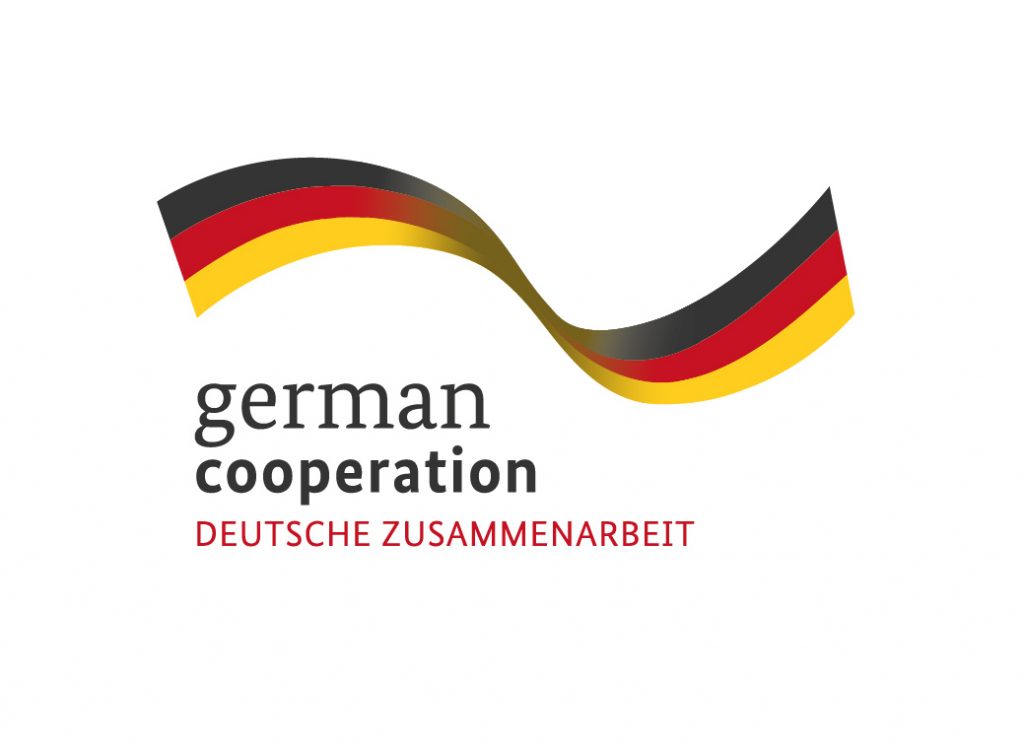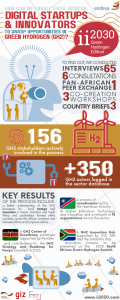
Green Hydrogen in Africa

How can diverse actors come together to ensure local startups and innovators benefit from the potential in green hydrogen in Africa?
Green hydrogen can be transformative for Africa. This upcoming sector will create green jobs and a new industry of startups and local innovators. Now is the time to create the fertile ground for entrepreneurs, who often lack access to adequate finance, skills, or even awareness of opportunities in the GH2 sector. The ii2030 Green Hydrogen (GH2) in Africa edition surfaced opportunities to strengthen the GH2 support ecosystem at the pan-African level as well as nationally in South Africa, Kenya and Namibia.

Where are the opportunities?
The focus countries of the exploration included South Africa, Kenya and Namibia. In all three countries, common key themes emerged, including the presence of large international actors dominating the green hydrogen landscape, lack of awareness of green hydrogen among local communities and decisionmakers, low collaboration for skills development and limited access to finance for green hydrogen innovators and entrepreneurs. A country brief and key recommendations were developed each for South Africa, Kenya and Namibia.

How did we create impact?
Through a co-creative process with key stakeholders, the ii2030 methodology discovered opportunities for African startups and innovators and potential support measures. The process focused on a strategic collaboration method between stakeholders to co-create effective change to answer these questions and more, including bilateral interviews, a series of online consultations, three in-person co-creation workshops, one pan-African peer exchange and celebrations in all three countries to acknowledge the progress and results of the process.
South Africa
During our co-creation workshop in Cape Town in June 2023, 18 organizations collaborated to co-create a systemic solution enabling startups to grasp opportunities in the green hydrogen sector. They developed a concept for the Green Hydrogen (GH2) Innovation Hub, a one-stop shop for green hydrogen innovation. GIZ South Africa, Lesotho & eSwatini has planned to support the Green Hydrogen Innovation Hub through the Research Institute for Innovation and Sustainability (RIIS) and the Saldanha Bay Innovation Campus. Features of the hub could include:
- Incubator and accelerator programmes for startups and innovators, including developing business models, design support, pitch training, and finance.
- GH2 research development and innovation lab
- Enabling infrastructure for startups supporting email addresses, offices and co-creation spaces
- Thought partnership and ideation capability
- Positioning near a port, perhaps within Special Economic Zones (SEZs)
Kenya
During our co-creation workshop in Nairobi in June 2023, 14 organizations collaborated to co-design a systemic solution enabling startups to grasp opportunities in the green hydrogen sector. They developed a concept for the Green Hydrogen (GH2) Centre of Excellence, a virtual and physical space for bringing stakeholders, ideas and resources together for technical understanding and trainings, exploring commercial opportunities and match-making. Features of the CoE could include:
- A hybrid center with physical (training) premises and virtual information/learning platform
- Incubator and accelerator programs for startups and innovators
- GH2 research, product development and innovation lab for startups, companies and training institutes
- Information center for communities and NGOs
- Enabling infrastructure for startups support with entrepreneurial trainings and mentoring
Results of the ii2030 process also informed the Green Hydrogen Strategy and Roadmap for Kenya, which launched in 2023.
Namibia
During our co-creation workshop in Windhoek in June 2023, 18 organizations across Namibia’s green hydrogen sector co-created four prototypes to achieve this goal. In addition to the ideated solutions, the ii2030 process highlighted the need for greater coordination in the Namibian green hydrogen ecosystem. The Ministry of Higher Education, Technology and Innovation became the champion of the sector’s coordination, taking forward the collaboration which sparked during the ii2030 process.
This programme was supported by Make-IT in Africa, a project implemented by Deutsche Gesellschaft für Internationale Zusammenarbeit (GIZ) GmbH on behalf of the Federal Ministry for Economic Cooperation and Development (BMZ).

Our supporters




